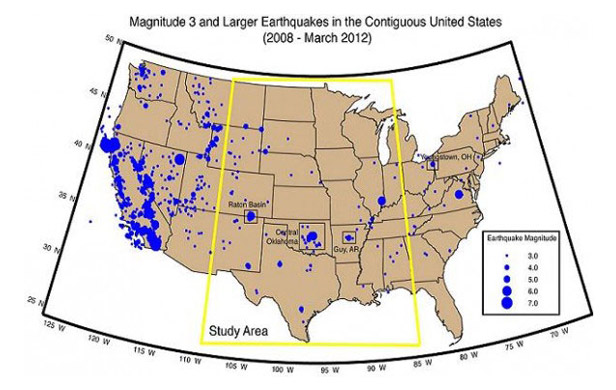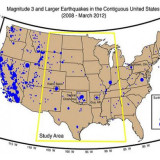
By Emily Schmall And Kristi Eaton, The Associated Press
AZLE, Texas – Earthquakes used to be almost unheard of on the vast stretches of prairie that unfold across the U.S. Midwestern states of Texas, Kansas and Oklahoma.
But in recent years, they have become commonplace. Oklahoma recorded nearly 150 between January and the start of May. Most were too weak to cause serious damage or endanger lives. Yet they’ve rattled nerves and raised suspicions that the shaking might be connected to the oil and gas drilling method known as hydraulic fracturing, or fracking, especially the wells in which the industry disposes of its wastewater.
Now governments in all three states are confronting the issue, reviewing scientific data, holding public discussions and considering new regulations.
[quote]In recent weeks, nighttime shaking in Oklahoma City has been strong enough to wake residents. [/quote]
Oklahoma rattled by quakes
The latest example comes Thursday in Oklahoma, where hundreds of people are expected to turn out for a meeting that will include the state agency that regulates oil and gas drilling and the Oklahoma Geological Survey.
States with historically few earthquakes are trying to reconcile the scientific data with the interests of their citizens and the oil and gas industry.
In recent weeks, nighttime shaking in Oklahoma City has been strong enough to wake residents. The state experienced 145 quakes of 3.0 magnitude or greater between January and May 2, 2014, according to the Oklahoma Geological Survey.
That compares with an average of two such quakes from 1978 to 2008.
[signoff3]
North Texas has had 70 earthquakes since 2008 as reported by the U.S. Geological Survey, compared with a single quake, in 1950, reported in the region before then.
Regulators from each state met for the first time in March in Oklahoma City to exchange information on the quakes and discuss toughening standards on the lightly regulated business of fracking wastewater disposal.
“This is all about managing risks,” said Oklahoma Corporation Commission spokesman Matt Skinner. “It’s a little more complicated than that because, of course, we’re managing perceived risks.”
Texas regulator hires state seismologist
In Texas, residents from the town of Azle, which has endured hundreds of small quakes, went to the state capitol earlier this year to demand action by the state’s chief oil and gas regulator, known as the Railroad Commission. The commission hired the first-ever state seismologist, and lawmakers formed the House Subcommittee on Seismic Activity.
After Kansas recorded 56 earthquakes between last October and April, the governor appointed a three-member task force to address the issue.
Fracking linked to quakes
Seismologists already know that hydraulic fracturing — which involves blasting water, sand and chemicals deep into underground rock formations to free oil and gas — can cause microquakes that are rarely strong enough to register on monitoring equipment.
However, fracking also generates vast amounts of wastewater, far more than traditional drilling methods. The water is discarded by pumping it into so-called injection wells, which send the waste deepunderground. No one knows for certain exactly what happens to the liquids after that. Scientists wonder whether they could trigger quakes by increasing underground pressures and lubricating faults.
Another concern is whether injection well operators could be pumping either too much water into the ground or pumping it at exceedingly high pressures.
No clear correlation: Industry advocates
Still, seismologists — and the oil and gas industry — have taken pains to point out that a clear correlation has not yet been established.
Nationwide, the United States has more than 150,000 injection wells, according to the Society of Petroleum Engineers, and only a handful have been proven to induce quakes.
Nonetheless, ExxonMobil is supporting a study by Southern Methodist University, company spokesman Richard Keil said.
“We’re sort of in wait-and-see mode,” he said.
Eaton reported from Oklahoma City.


I can not judge the implications of this. However, it is interesting how often our activities generate effects that may not have been expected by many among us.